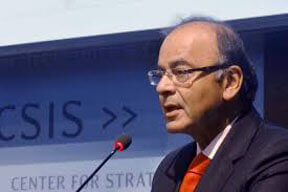 WASHINGTON: Promising a ‘modern tax system’ with low and globally competitive rates, Indian Finance Minister Arun Jaitley has assured foreign investors against any retrospective action and said taxpayers will be seen as “partners and not as potential hostages or victims”.
WASHINGTON: Promising a ‘modern tax system’ with low and globally competitive rates, Indian Finance Minister Arun Jaitley has assured foreign investors against any retrospective action and said taxpayers will be seen as “partners and not as potential hostages or victims”.
For domestic taxpayers also, the rates need to be low as taxes are seen as money being forcibly transferred from citizens to the state, but the tax net should be wide enough so that everyone feels being part of the government, he said.
Jaitley said he is “acutely aware” that there are concerns about retrospective taxation, tax harassment and arbitrariness in tax administration, especially those relating to cases of transfer pricing — a term mainly used for deals between entities belonging to the same multinational group.
Asserting that the government is committed to a transparent and predictable tax regime, Jaitley said: “These are not expressions of intent and we have translated them into action.”
He also said that several steps have been taken to reduce litigation and the tax authorities have been asked not to “file frivolous appeals in a routine manner”, while the government did not contest high court orders that went in favor of Vodafone and Shell.
“Let me emphasize that we are absolutely committed to a transparent and predictable tax regime. There will be no retrospective actions and we will see taxpayers as partners not as potential hostages or victims,” Jaitley said in his address to Peterson Institute for International Economics here last night.
Spelling out his vision of a modern tax system, Jaitley said: “Tax policy and administration should incentivise compliance. They should be administered fairly, transparently, with minimum discretion, with no harassment of taxpayers but also ensuring that tax evasion is dealt with firmly.”
“We will aim to keep the rate competitive and close to international levels and minimize exemptions,” he said. (MORE) PTI LKJ
“The tax net should be wide so that all citizens feel they are part of government, but rates should be low, because taxes after all are seen as forcible transfer of money from citizens to the state,” Jaitley said while adding that India needs to have a modern 21st century system for indirect taxes, direct taxes and tax administration.
The Finance Minister said that India is on its way to have a much more modern taxation system with a series of administrative measures, along with legislative reforms and constitutional amendments initiated by the government.
“Such a modern tax system, which is friendly to the people and businesses, would be a key to realizing the goal of a double-digit growth,” he said.
The Finance Minister, who is here to participate in the meetings of IMF and World Bank, exuded confidence that the Parliament would pass the necessary constitutional amendment bill for GST in the next three weeks.
“GST is a modern tax, a consumption-based value-added tax, and a tax that avoids tax cascading,” he said, adding that this would create a broad tax base and will strengthen revenues going forward and increase the tax-GDP ratio.
“It will not only promote transparency and reduce corruption because of the paper trail it will create; but would also go towards creating a common Indian market because it will replace a number of state-levied taxes.
“We aim to secure legislative passage within the next three weeks at the Centre after which it will go to the states,” he said, while adding that the GST council, which has representations from all states and the Centre, will decide on a revenue-neutral rate.
“We will aim to keep the rate competitive and close to international levels and minimize exemptions,” he said. The government aims to implement the GST by April 1, 2016.
Asserting that the direct tax system also needs to catch up with the modern GST system, Jaitley said in the budget he have announced important corporate tax reform to reduce rates, and broaden the base by eliminating exemptions.
“We are acutely conscious that capital chases destinations with the cleanest tax systems and competitive tax rates. The ASEAN average corporate tax rate is about 21-22 per cent.
Accordingly, the corporate tax rate will come down from 30 to 25 within 4 years, beginning 2016,” he said, while adding this was being introduced next year to give companies sufficient time to adjust so as not to surprise taxpayers. Jaitley further said capital gains of FPIs will not be subject to Minimum Alternative Tax (MAT). To promote offshore funds, it has also been proposed that the activity carried out through an eligible fund manager located in India will not constitute a business connection for being taxed in India.
This will help in relocation of fund managers in India, from Singapore and other such destinations, the Minister said.
Listing out the measures announced by him in the Budget, Jaitley also said that the wealth tax has been abolished and replaced with a tax on the super-rich, which has also been enhanced by two percentage points to make the tax administration more equitable and progressive, he said.
At the same time, “We have increased the exemptions limit for savings,” Jaitley said.
On the controversial issue of retrospective taxation, he said a high-level committee has been set up to ensure fair treatment of such transactions.
Besides, changes have been made to the Transfer Pricing method for taxation of R&D centers from Profit-Split method to cost-plus method, while introducing Safe Harbor Rules with specified margins on a broad spectrum of sectors without any limit on transaction values.
The government has also introduced Advance Pricing Agreement (APA) provisions to give taxpayers the option to seek tax certainty in transfer pricing transactions.
Besides, several measures have been taken to ensure “more speedy redressal of tax disputes before appellate or judicial authorities”.
“In order to reduce litigation several measures have been taken. The mechanism of Dispute Resolution Panels (DRP) has been put in place, the scope of Settlement Commission and Authority for Advance Rulings (AAR) has been expanded with opening of new benches of AAR,” Jaitley said.
He said the Tax Administration Reforms Commission (TARC) has submitted a number of recommendations to the Government for charting out a road-map for much-needed structural changes in the tax administration set-up. “The recommendations are being currently examined for implementation,” he said.
“But let me highlight an action that have not received sufficient attention. This year two High Court ruling went in favor of Vodafone and Shell which the government did not contest, reflecting our commitment to not being adversarial,” Jaitley said.–PTI






